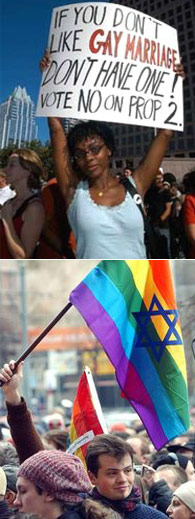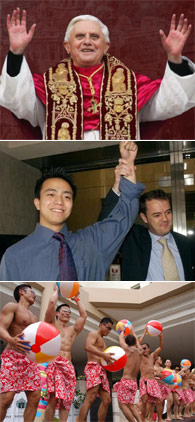
Top: Same-sex marriage advocate in Texas, US; demonstation in Poland to protest the banning of a gay pride parade in Warsaw last month.
Spain and Canada moved to legalise same-sex marriages in July this year. They joined the Netherlands and Belgium as the four countries worldwide to have done so, with South Africa set to follow suit before Dec 1, 2006.
Spanish premier Jose Luis Rodriguez Zapatero sounded the clarion call for affording marriage equality to all on Jul 4, where he told Spanish parliament, "our country takes another step in the path of liberty and tolerance."
England and Wales' civil union laws for same-sex couples came to effect earlier this month, and brought the tally of countries where same-sex unions are legal to 14. Austria and the Czech Republic will do likewise next year.
On Dec 21, close to 700 gay and lesbian couples registered their partnerships in the UK, including the nuptials of singer Elton John and his partner David Furnish, which grabbed worldwide media attention.
"It has been a long struggle for equal rights to gay people in Britain, but now, in the 21st century, we have real civil rights, tolerance and final acceptance in our lives," John wrote in The Observer, a UK newspaper. Meanwhile, British Prime Minister Tony Blair hailed the move as "a modern, progressive step forward for the country."
Amongst the first to announce their union was 41-year-old Singaporean, Ghani Jantan and his 54-year-old British partner, John Walker.
Former Soviet states cripple rights movements
The outlook was less optimistic in parts of Eastern Europe, as nascent gay rights movements were quashed in former Soviet territories.
On July 23, participants of Latvia's first gay pride parade were pelted with eggs and threatened with violence by thousands of anti-gay protestors. Early this month, it became the only member of the European Union to ban gay marriage in its constitution.
Likewise, Lithuania's conservatives are aiming to enact a ban on same-sex marriage.
Newly sworn in Polish president Lech Kaczyinski reaffirmed his hostility to gay rights. The former mayor of Warsaw had banned gay pride celebrations in June for a second year running. In November, armed riot police arrested more than 65 of the hundreds of gay rights activists, who were pelted with stones and firecrackers at a demonstration that protested the banning of a gay pride parade in the city of Pozan.
Brett Lock, spokesperson for UK based gay rights groups OutRage! cautioned the EU of the recriminations of not censuring Poland for its actions. "These exemptions may not be limited to Pride parades, but could ultimately include employment rights, partnership rights and legal protection from harassment and hate-crimes," he told reporters.
A stronger anti-gay coalition emerges Stateside
Across the Atlantic, the United States failed to build upon the victorious Massachusetts ruling of 2004, where it became the only US state to legalise same-sex marriage, as socially conservative policies grappled the country.
This September, Californian Governor Arnold Schwarzenegger vetoed a same-sex marriage bill blocking union for GLBT Californians and last month, Texas became the nineteenth state to ban same-sex marriage in its constitution. Currently, seven states in America have same-sex civil union laws in place.
The increasing clout of the conservative and Christian right provided virulent opposition to proponents of gay rights and equality treatment as well.
Focus on the Family, a US-based Christian non-profit organisation, released a list to caution parents of their child's potential homosexuality. "A tendency to cry easily, be less athletic, and dislike the roughhousing that other boys enjoy," and "a susceptibility to be bullied by other boys, who may tease them unmercifully and call them "queer," "fag" and "gay" were cited as tale-tale signs on the seven point memo.

From the top: Pope Benedict XVI made clear his strong anti-gay stance - barring even celibate gay men from priesthood, twenty-year-old William Leung challenged the age of consent laws for gay men in Hong Kong and Fridae's Nation party was held in Phuket after Singapore authorities refused organisers a licence to hold the 3-day event.
Pope Benedict XVI made clear his strong anti-gay stance shortly after his elevation to the pontificate, condemning same-sex marriage as "pseudo-matrimony" in June. A month after, he approved a recommendation barring gay men from priesthood. According to a Reuters report, the Vatican banned men 'who publicly manifest their homosexuality'.
In September, the Vatican then begun investigations to identify existing gay priests in America's 229 seminaries, to in a belief that it would prevent a repeat of the child sex scandal which rocked the Catholic Church in 2003.
Human rights violations remain an unsolved quagmire
Oppression and violent persecution still continued in many countries, where institutionalised and religious homophobia continued to wield a vice like grip on their populations in 2005.
Last month, 26 men were arrested at an Abu Dhabi hotel in the United Arab Emirates for "organising a gay wedding ceremony". Interior Ministry officials later suggested the men would be subjected to psychological and hormone treatment to "cure" their sexual identity. The men continue to be detained.
This July, two gay individuals, a young man and a minor were executed in Iran's second largest city. Convicted of sexually assaulting a 13-year-old boy, they were each lashed 228 times before a public hanging. President Mahmoud Ahmadinejad has heightened repressive campaigns against gay individuals, with two more gay men confirmed for execution.
In June, GLBT rights activist Brian Williamson, a founding member of the Jamaican Forum for Lesbians All-Sexuals and Gay (J-FLAG), was found brutally murdered in Jamaica. Amnesty International decried the murder as a hate crime, suggesting he was killed because of his sexuality and tireless advocacy of gay and lesbian rights. In a press release, the human rights watchdog rebuked Jamaica for "suffer(ing) from an appalling level of homophobia."
Advocacy in these parts took on a different tenor, as rights groups clamoured to secure basic freedoms from persecution and fought for fundamental equality before the law.
Hong Kong ruling a fillip for regional gay rights
In Asia, efforts that sought greater civil liberties and representation for the GLBT community were met with mixed responses from Asian governments, and consequently varying degrees of success.
In the year's most encouraging development for gay rights in Asia, Hong Kong's landmark gay sex ruling struck down discriminatory sodomy laws in August. A judged ruled the laws - that men under 21 who engage in consensual sodomy can be imprisoned for life - to be unconstitutional, calling them a "grave and arbitrary interference with the right of gay men."
Twenty-year old William Leung, who challenged the ruling, rejoiced, saying, "the difference is I can finally have a loving relationship without being scared of (being) thrown into jail for life imprisonment."
While laws criminalising consensual gay sex have been struck down in Hong Kong and Fiji this year, they remain intact in many Asian nations such as Indonesia, Malaysia and Singapore.
In China, Shanghai's prestigious Fudan University began offering undergraduates a course in Homosexual Studies in September. Wan Yanhai, founder of Aizhi Action Project, a Beijing-based NGO which promotes HIV/AIDS awareness and prevention, was quoted as saying, "the new course at Fudan is a major breakthrough because for the first time it's focusing on the culture of homosexuality and not just about AIDS."
China's about turn, Singapore's dalliance with the pink dollar ends
The tide of promising change was stemmed in China on Dec 23, when Chinese police ordered the Beijing's First Gay & Lesbian Culture Festival to be shut down. Police officials halted the scheduled event on its opening day, citing a failure to seek a permit as the reason for the ban. When the event was moved to the On/Off Bar, police raided the bar and cancelled the event.
This move paralleled Singapore's denial of a permit for the Nation.05 party in July, which authorities deemed "contrary to public interest". The country's gay community responded by celebrating IndigNation, Singapore's first unofficial Gay & Lesbian Pride in August, and Nation.05 was instead held at Phuket in November.
The ban marked the end of Singapore's brief courtship with the pink dollar in 2004, as gay rights monitors in the city-state lamented the lack of tangible change in attitudes towards gays and lesbian individuals, and criticised authorities for paying lip service to inclusivity and liberalisation.











 Printable Version
Printable Version










Reader's Comments
Be the first to leave a comment on this page!
Please log in to use this feature.